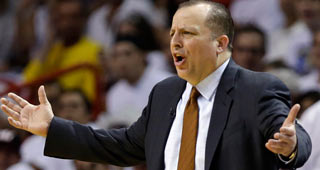You can’t get through life just by gritting your teeth, but Tom Thibodeau is giving it a try. The stories are old hat by now: no wife or kids, few if any outside interests, lived in a hotel a fifteen-minute drive from the United Center during his five seasons in Chicago, unwinds from the stress of a game by watching game tape for hours and hours. Reporters and colleagues remarked that he seemed a lot healthier during his one-year sabbatical. He dropped some weight, got his voice back, and stopped sweating vegetable oil. Of course, he was never going to stay away for long. He’s addicted to the job’s anguish. Who knows if he’s ever happy for more than a fleeting moment, but he is at least in his element growling half-heard defensive instructions or two housed pots of coffee into a film session. If you were feeling starry-eyed, you could say he believes in the salvational power of work. If you really inspect him, though—see that he looks like he’s been to hell and back, and that hell is made of spare ribs—you might come to the conclusion Thibs is only alive when he’s at the end of his rope.
This self-destructive single-mindedness makes him a rich character and really good at what he does, but it also renders him a spiritual nomad. When Thibodeau left Chicago, the fact that he was done dirty by Gar Forman and Jim Paxson overshadowed the reality that it was probably time for him to go, not because he hadn’t achieved enough during his time with the Bulls but because at some point you’ve got to remove the clay from the kiln or it’ll turn to ash. Two summers ago, the Bulls were on the verge of a rebuild—or they should have been anyway; they’re just now enacting one in earnest—and Thibs isn’t a coach you go through a second cycle with. He’s basketball cocaine. He speeds you up doubly and ages you triply.
The curious thing is, he didn’t take in year one with the Wolves. Chalk it up to a young squad that was being properly coached for the very first time. Thibs has earned the benefit of the doubt. But the Wolves hardly resembled the greasy genius’s Bulls. They were near the bottom of the league, sandwiched between the Knicks and Kings, in defensive rating. They were awful toward the end of games, blowing numerous second-half leads and looking like foals on an ice rink during crunchtime. And strangest of all, Thibodeau had what seemed like his type of player at point guard—Ricky Rubio is a gifted passer with no jumper who can guard two positions ably, more metaphysically circa 2011 Bulls-like than Derrick Rose ever was—yet spent the season trying to trade him, finally succeeding over the summer. What some imagined as a quick renovation has turned out to be a slightly sloggier project.
Concern hasn’t peaked yet, and it might never get there. Fleecing his ex-employer for Jimmy Butler will do more for Thibodeau’s squad than even his estimable expertise will. Butler will be twenty-eight by the time the season starts. He’s a star right in the thick of his prime. To say he’s a little bit less than elite at everything sounds like faint praise, but the wide breadth of his talent is his greatest strength. You can run the offense through him or have him cut or spot-up off the ball. He can bother all but the quickest point guards and the burliest big men on defense. He’s perennially among the league leaders in minutes per game and has developed into a capable playmaker over the past couple of seasons. He’s a player with only scant flaws. Thibodeau knows how to use him, but he’s also basically impossible to misuse. Butler will score twenty-two points a night and do whatever the rest of the team can’t.
Thibs will need the boost. The thing about unrelenting hardassery is it quickly becomes unconvincing when it doesn’t yield results. Take Scott Skiles’s career, for instance. He’s been canned midseason three times and lasted just one year in Orlando because once he starts to lose a team, the relationship deteriorates like it’s being depicted in a time-lapse video. Thibodeau evidently has a defter touch than Skiles—there are ex-players who despise that dude—but the same basic principle applies: you can be tyrannical so long as there’s growth. Stalling invites revolt.
Which is why it’s hard to see Tom Thibodeau playing Gregg Popovich to Karl-Anthony Towns’s Tim Duncan. Thibs isn’t much of a humanist—you get the sense he’d plant his perma-throbbing brain into an android body if he could—which means he alienates everyone eventually. He’ll push in Minnesota until there’s a snapping sound, then move on. But in the meantime, many developmental miles separate what the Wolves are and what they have the potential to become. We know how Thibodeau will try to get them there: red-faced rants and hard-won expertise and an embrace of the miserably difficult. He challenges his players to become like him, which is a challenge nobody has yet been totally up to, but they’ve won a lot of games along the way to imperfect Thibs-esque oneness with affliction. This is the season we find out how whether the Wolves are going to lean into or turn away from Thibodeau's madness, if they can see the reward in the struggle.
More Futures: Atlanta Hawks, Boston Celtics, Brooklyn Nets, Charlotte Hornets, Chicago Bulls, Cleveland Cavaliers, Dallas Mavericks, Denver Nuggets, Detroit Pistons, Golden State Warriors, Houston Rockets, Indiana Pacers, Los Angeles Clippers, Los Angeles Lakers, Memphis Grizzlies, Miami Heat, Milwaukee Bucks, New Orleans Pelicans, New York Knicks, Oklahoma City Thunder, Orlando Magic, Philadelphia 76ers, Phoenix Suns, Portland Trail Blazers, Sacramento Kings, San Antonio Spurs, Toronto Raptors, Utah Jazz, Washington Wizards



